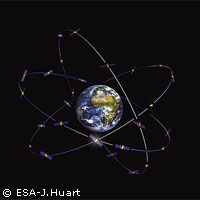Commission and Presidency seek new Galileo arrangement
The German EU Council Presidency has called for a new approach to Galileo, Europe's satellite navigation system, following the failure of partners within the Joint Undertaking to reach agreement on how to take the project forward. The planned network of 30 Galileo satellites is intended to beam radio signals to receivers on the ground, enabling users to pinpoint exact locations. Galileo is a joint European Commission-European Space Agency (ESA) initiative, and was to be financed through a public-private partnership. The Commission set the deadline of 10 May for the companies within the Joint Undertaking to put forward a single company structure for the running of Galileo. The companies - EADS, Thales, Inmarsat, Alcatel-Lucent, Finmeccanica, AENA, Hispasat, and TeleOp - were ultimately unable to agree on such a structure. 'I regret that today saw the failure of months of negotiations within the European consortium on their participation in the building of the European satellite navigation system. It is now important to take the right decisions so that Galileo can succeed as a driver of high technology in Europe,' said German Parliamentary State Secretary within the Economics and Technology Ministry, Peter Hintze. 'Europe needs an independent navigation signal which can be used reliably even in times of crisis,' he added. Mr Hintze called upon the European Commission to now propose an alternative viable scenario that 'keeps an eye on the costs and takes account of the proportional funding from the Member States'. One suggestion from Mr Hintze was that ESA could build the system on a public-sector basis. The Commission is expected to present a proposal within the next weeks that will then be discussed by the EU's transport ministers in June. 'The matter is urgent, since Europe faces global competition as a base for technology, Galileo should demonstrate Europe's innovative capacities to the world and provide the most precise navigation signal of all time,' said Mr Hintze.
Countries
Germany



